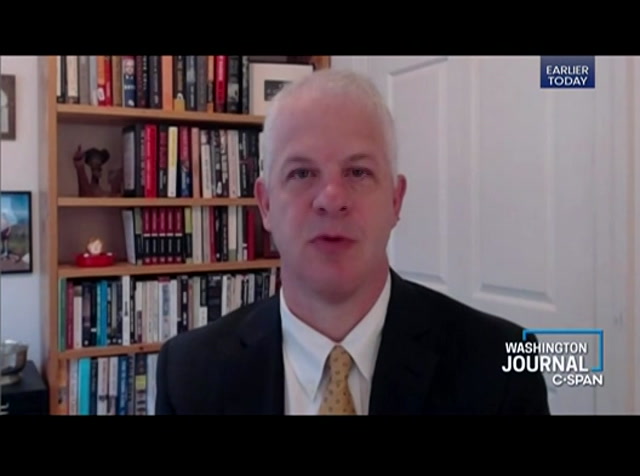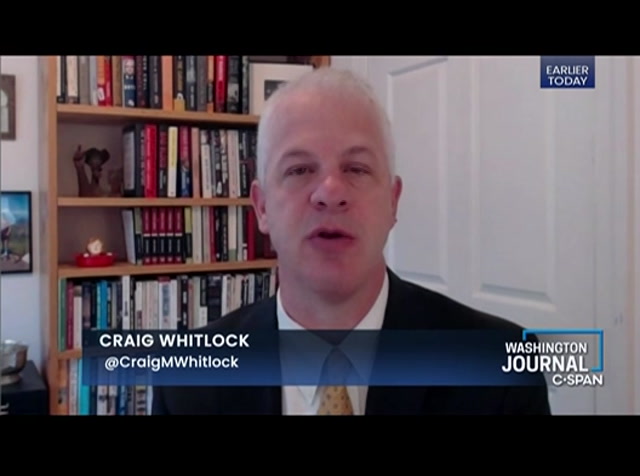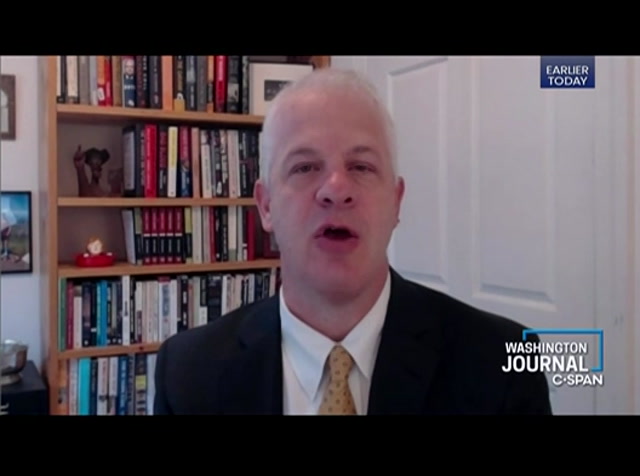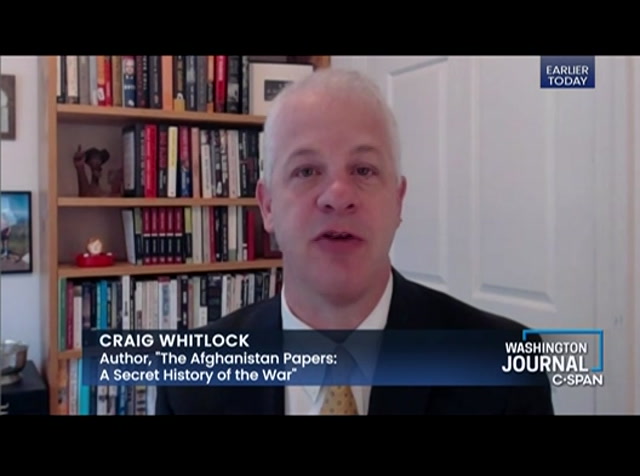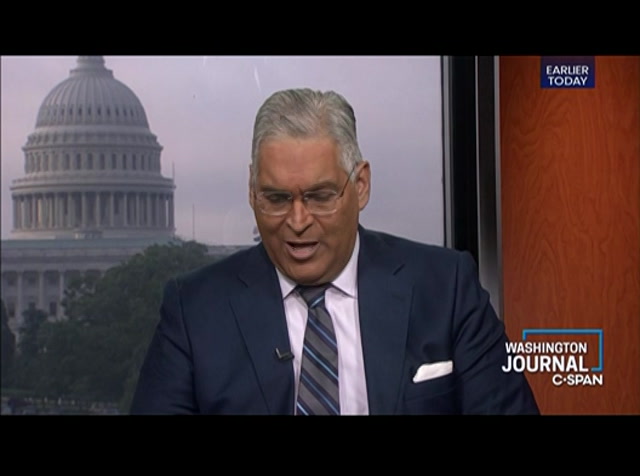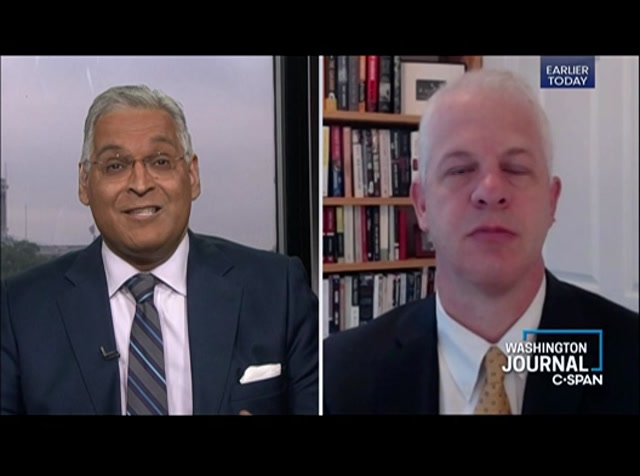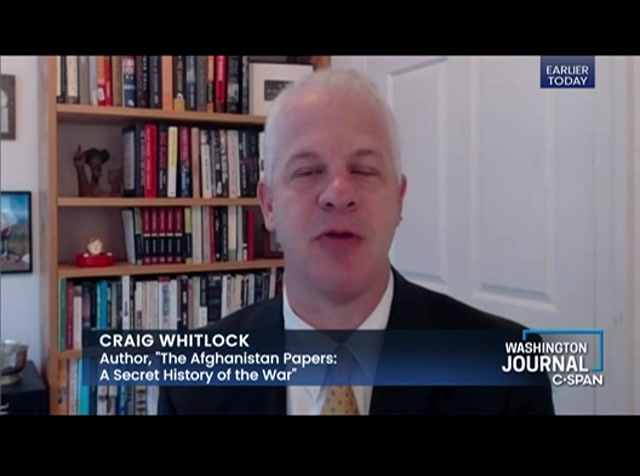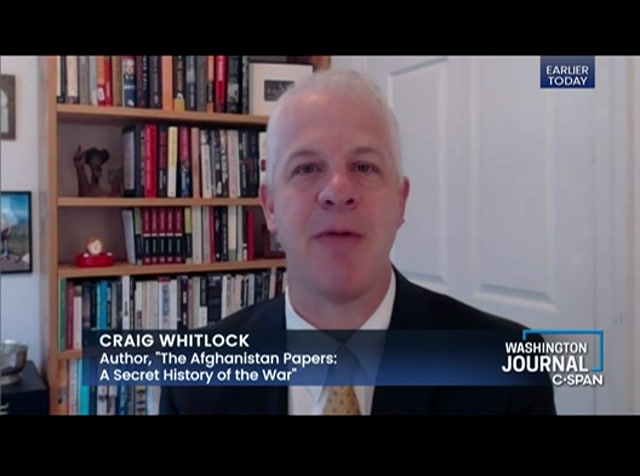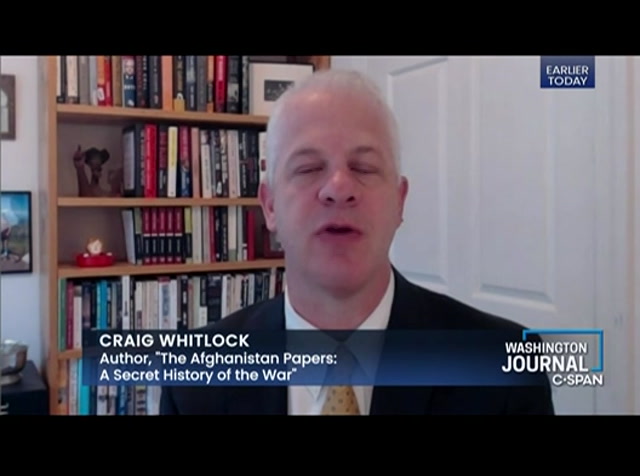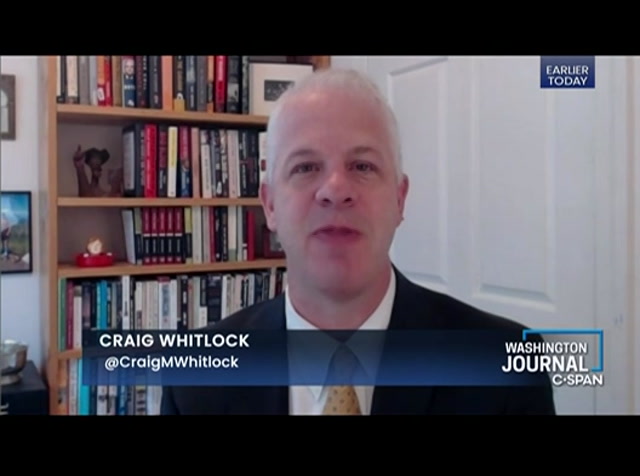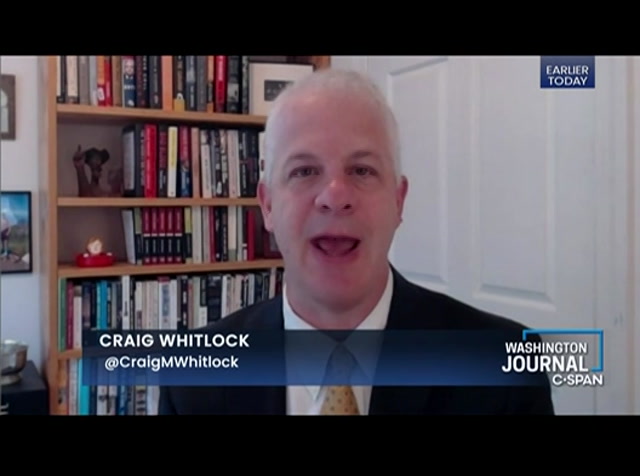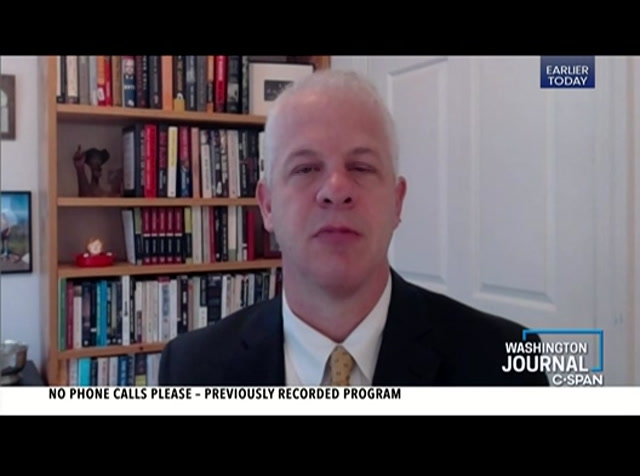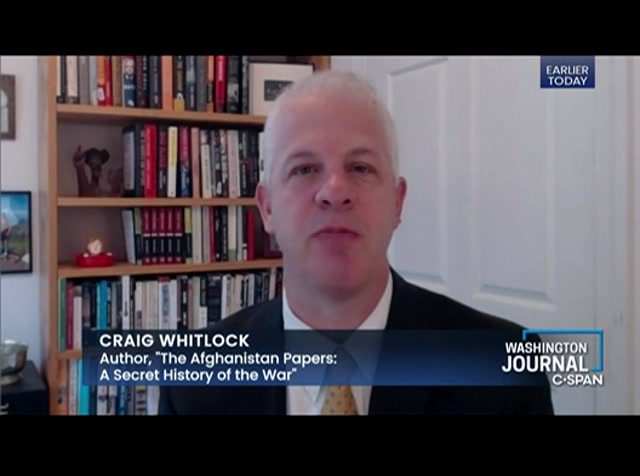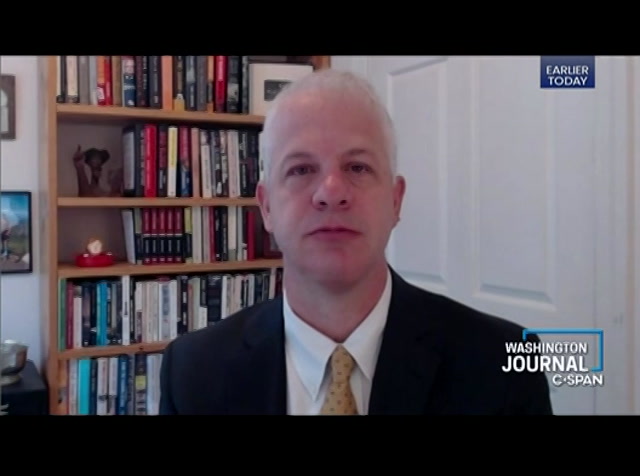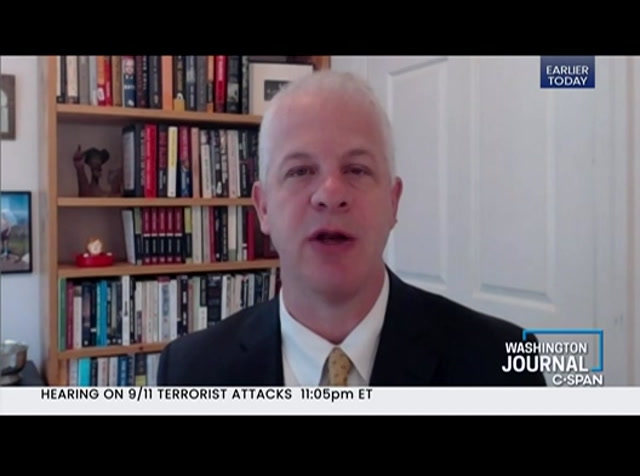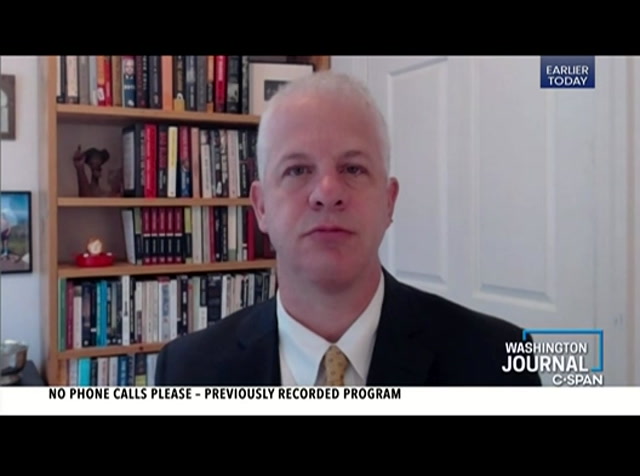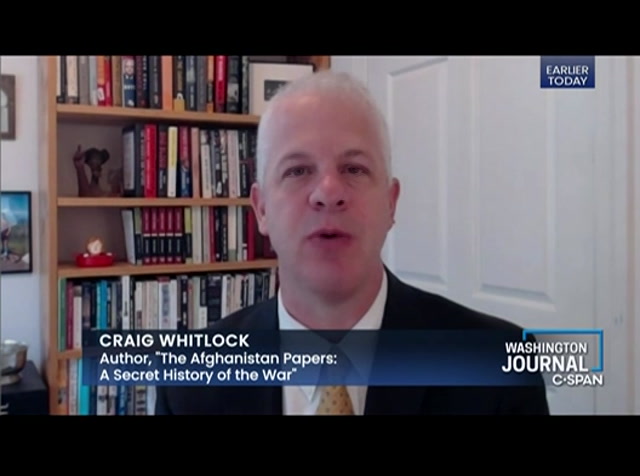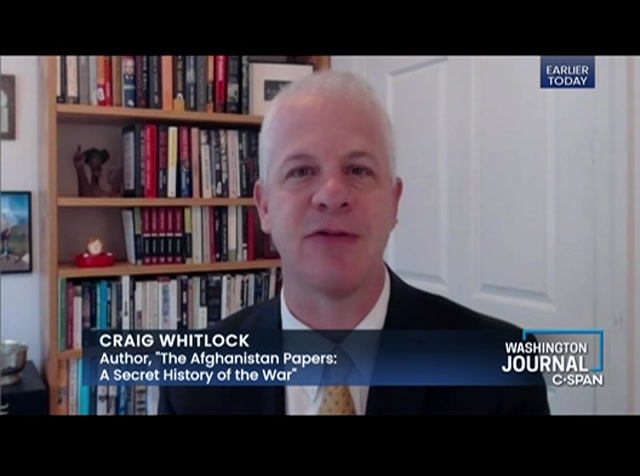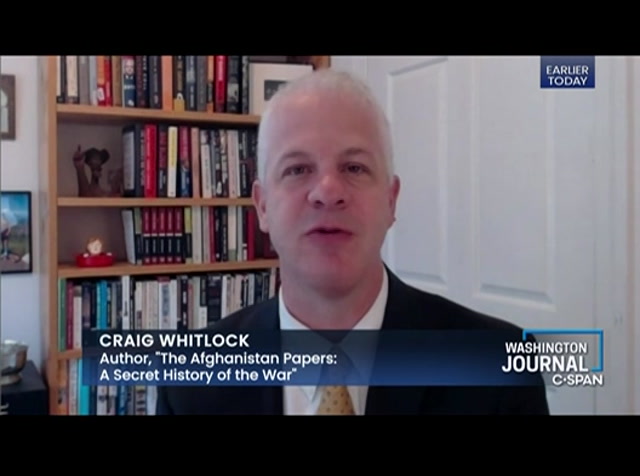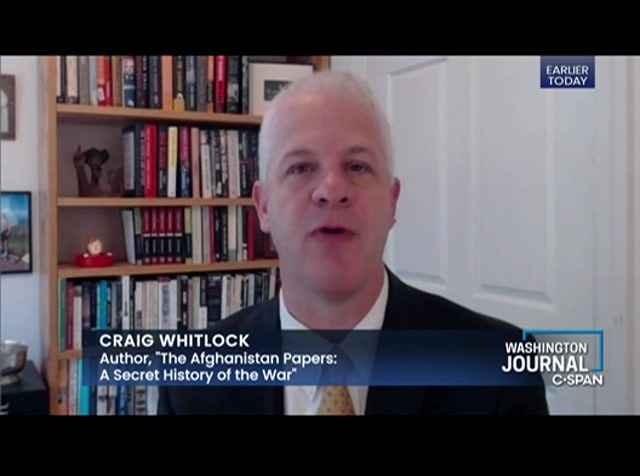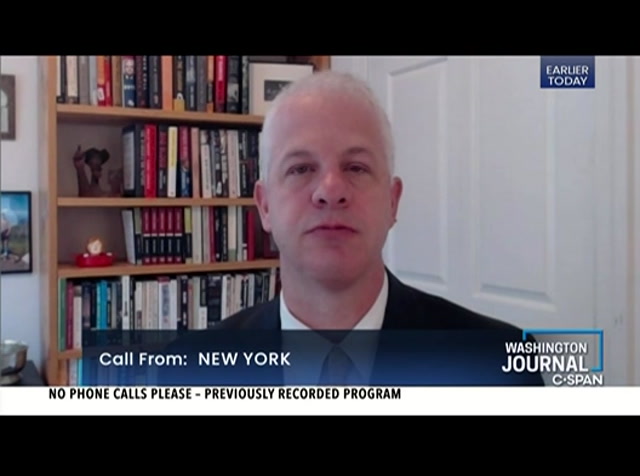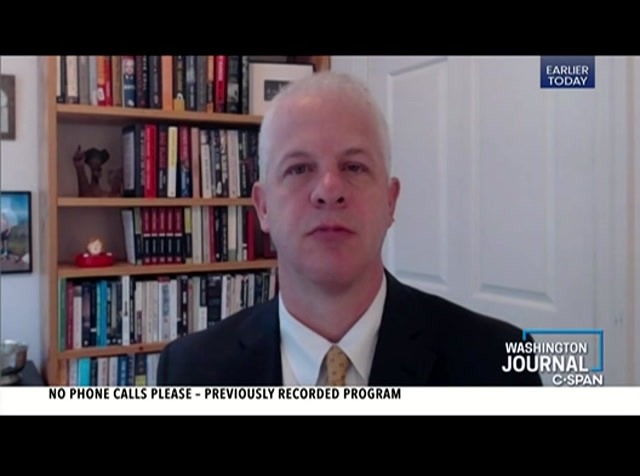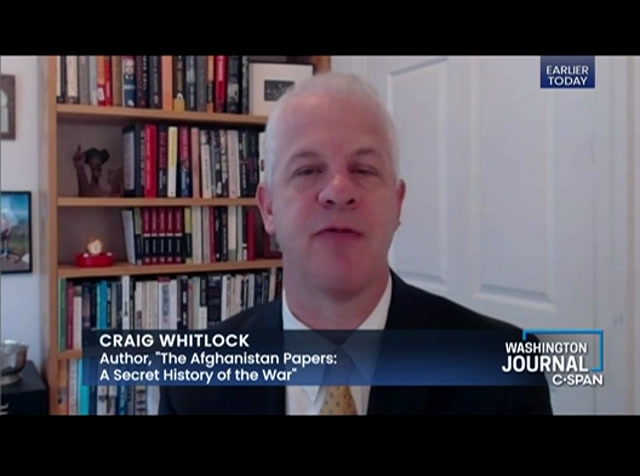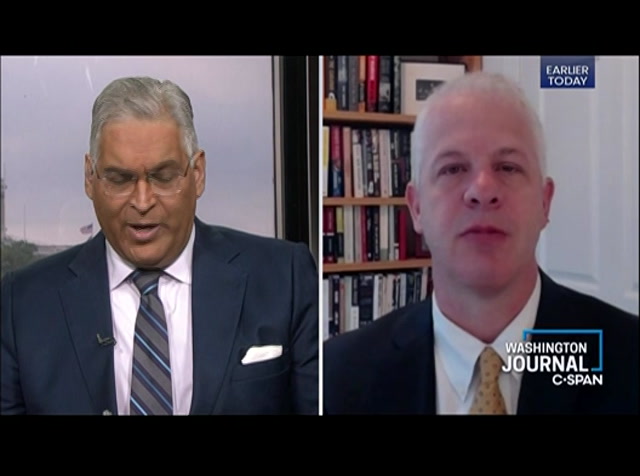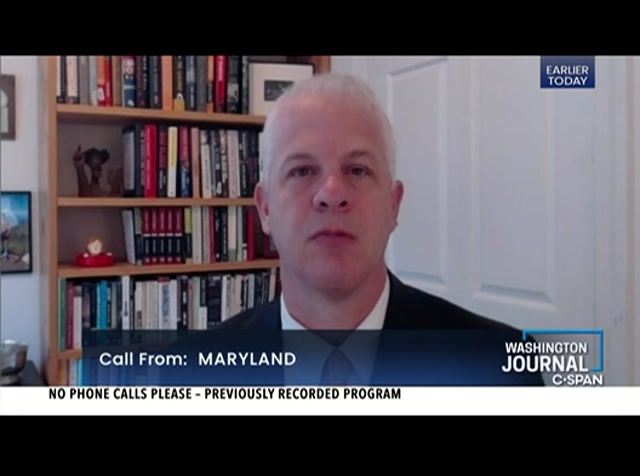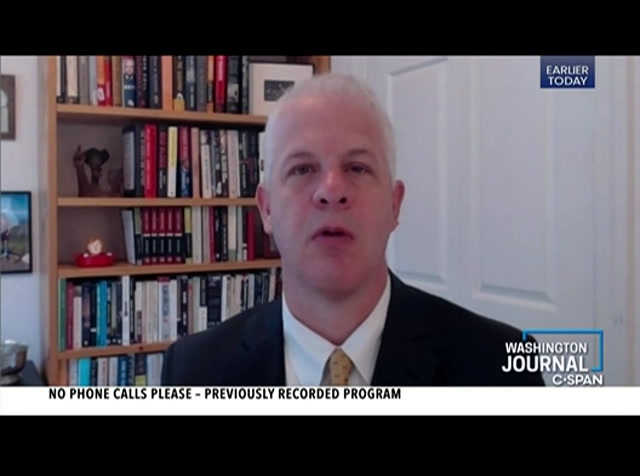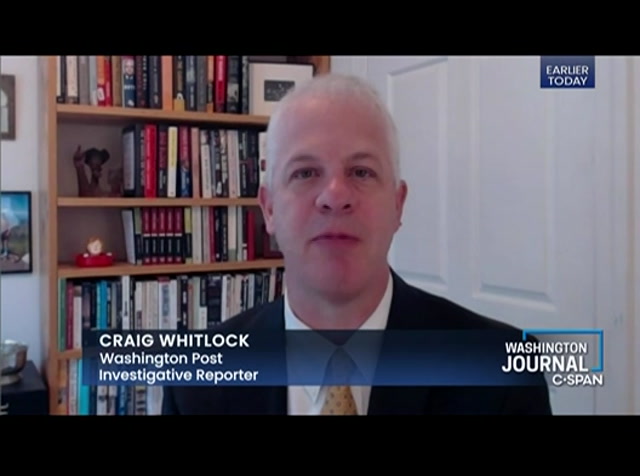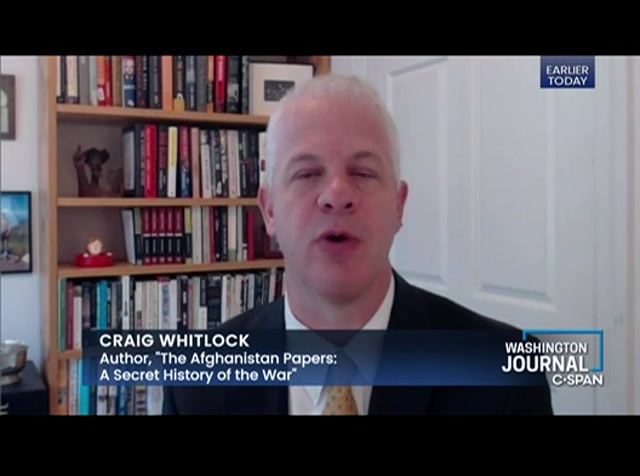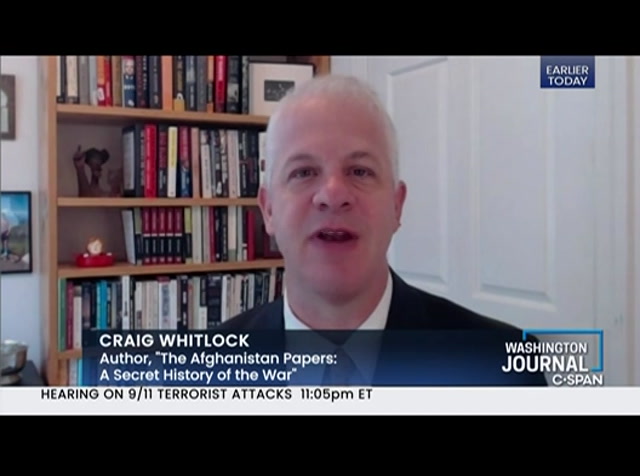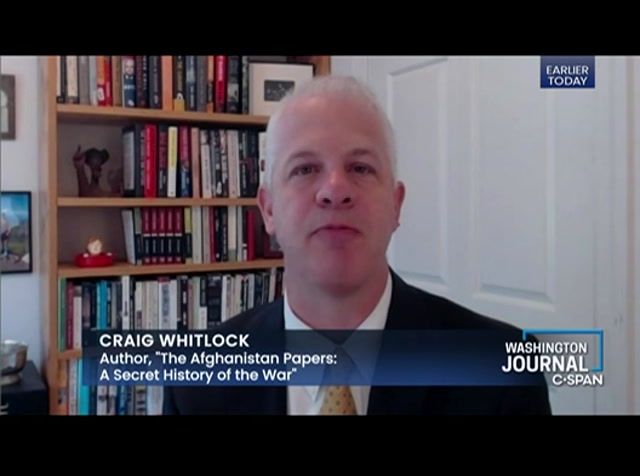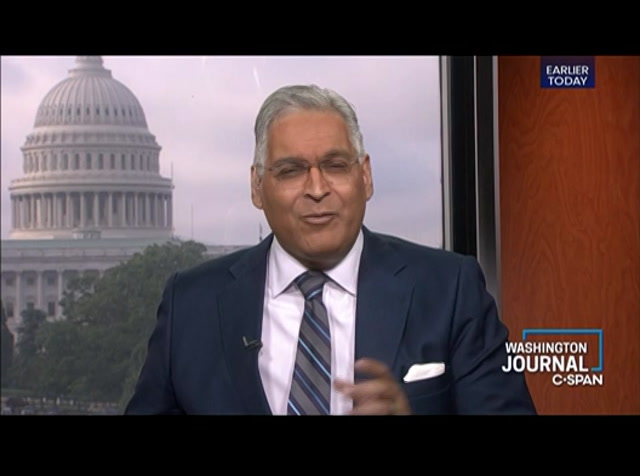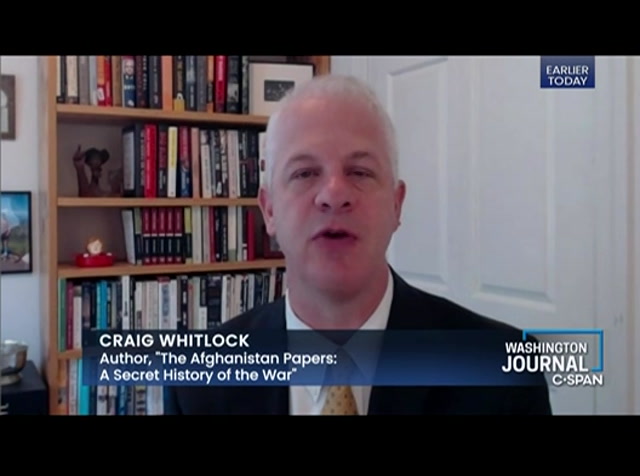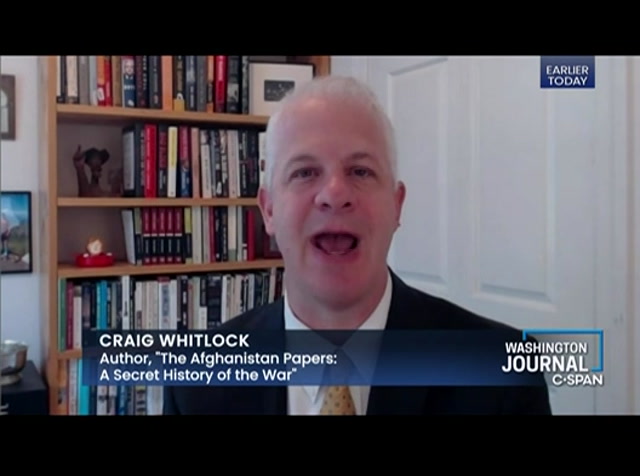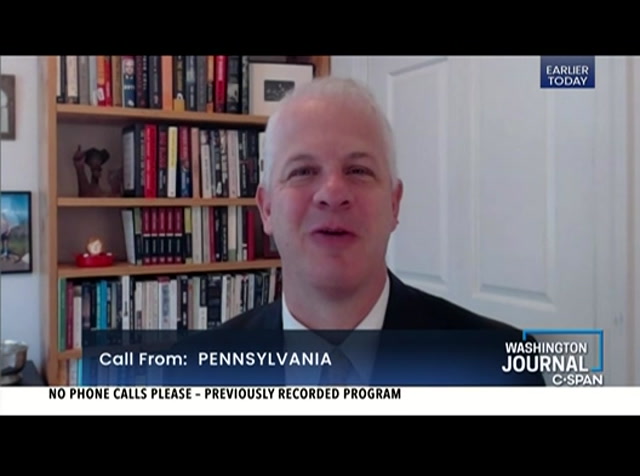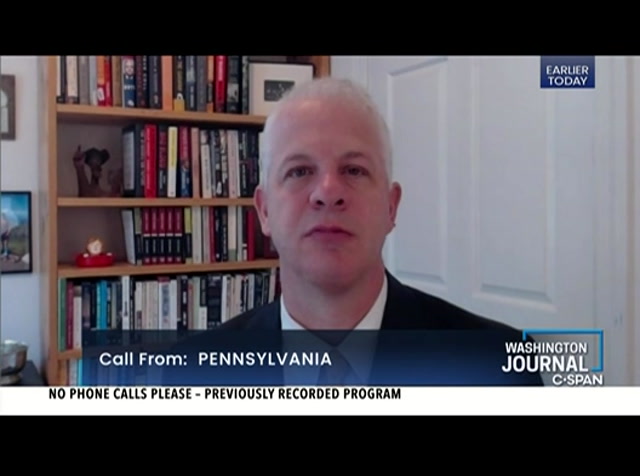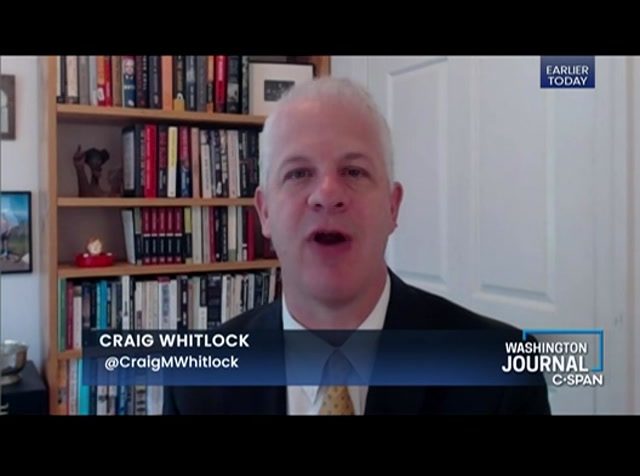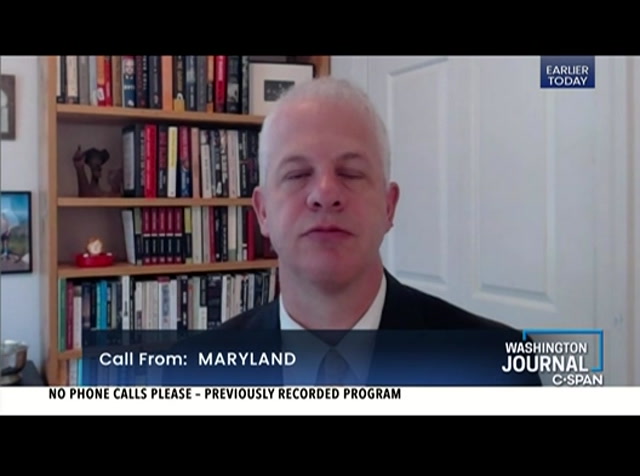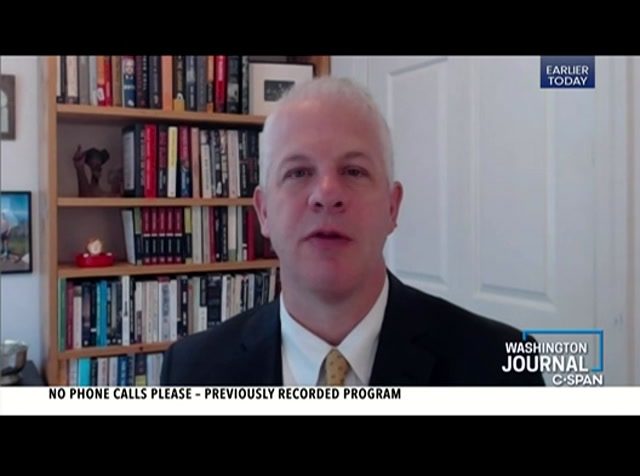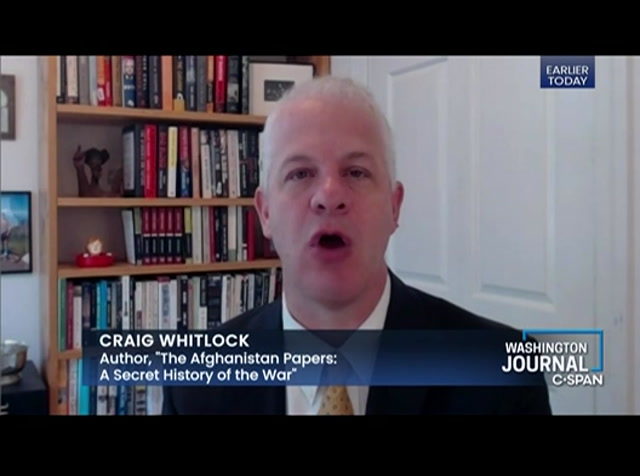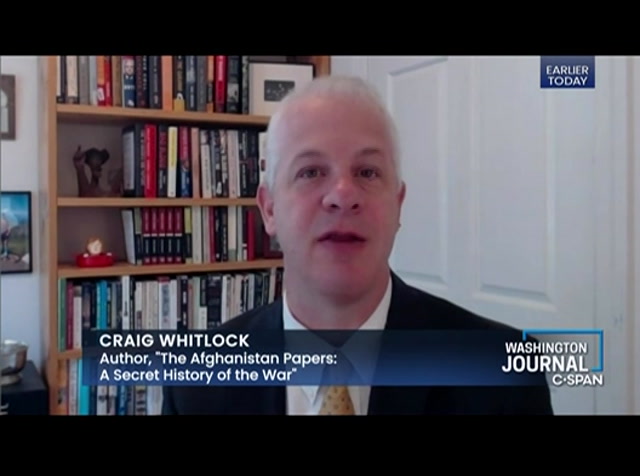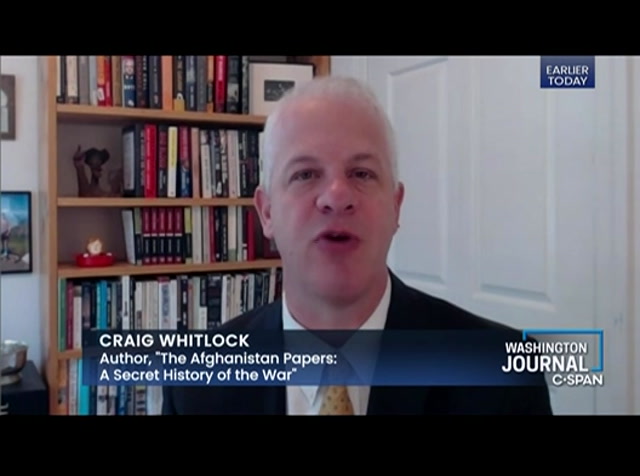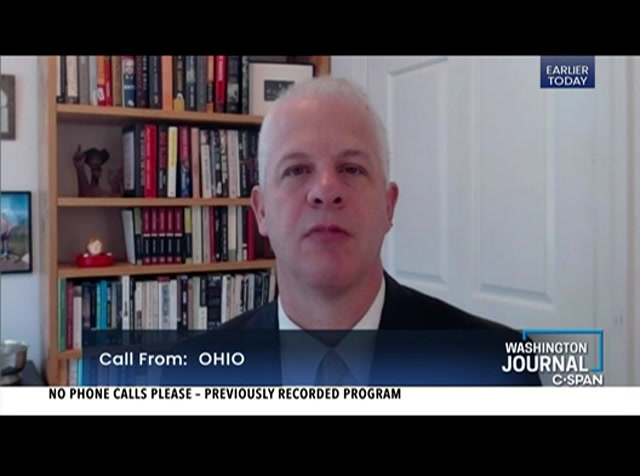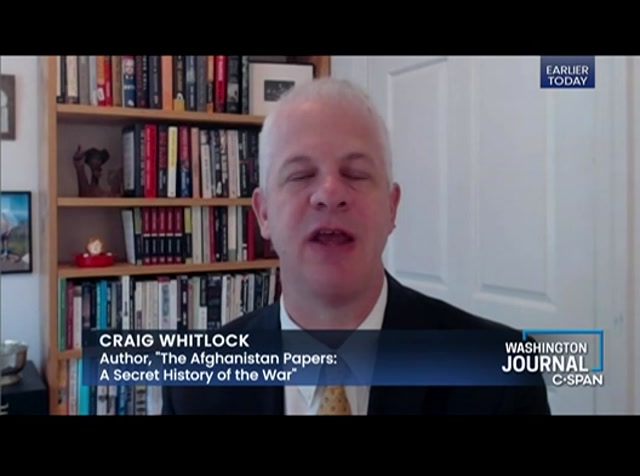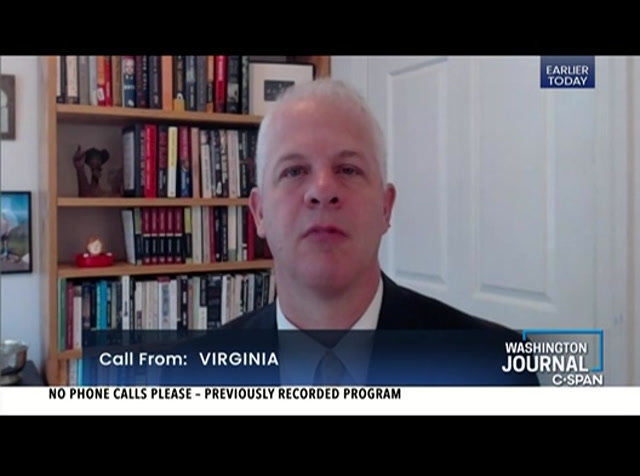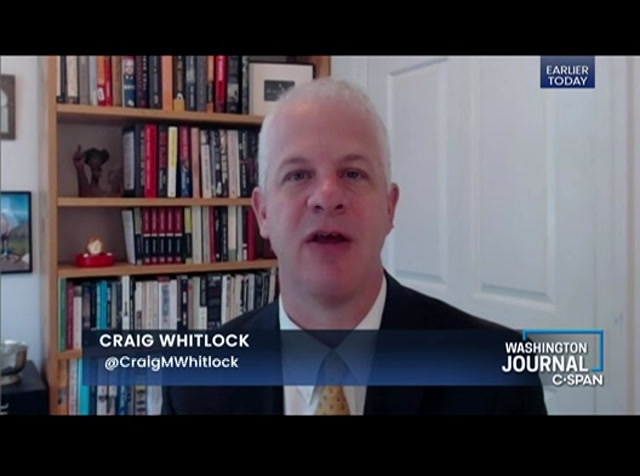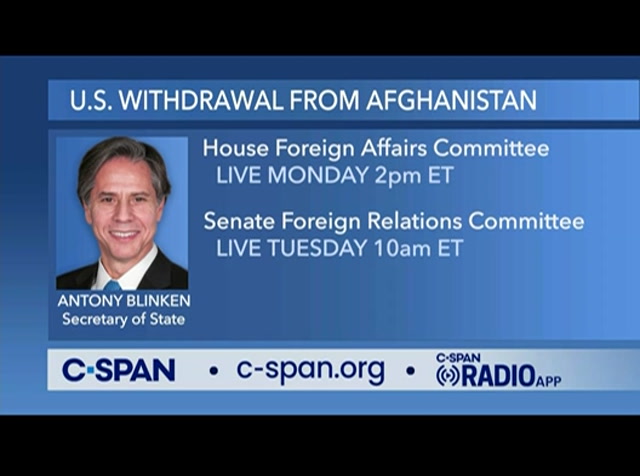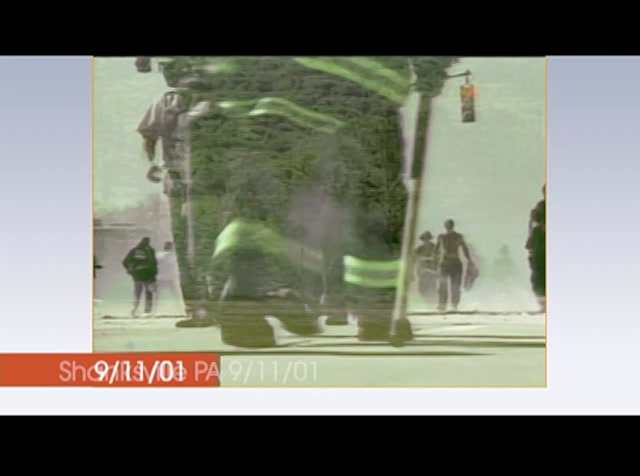tv Washington Journal Craig Whitlock CSPAN September 8, 2021 10:16pm-11:05pm EDT
10:16 pm
announcer: buckeye broadband supports c-span as a public service along with these other television providers, giving you a front row seat to democracy. host: joining us is craig whitlock, an investigative reporter for the washington post and the author of "the afghanistan papers: a secret history of the war." mr. whitlock, thank you for coming on. guest: thanks for having me. host: in the first opening pages, you write this, mr. whitlock, and i will have you elaborate. "this book does not aim to provide an exhaustive record of the u.s. war in afghanistan as well as combat operations. rather, it is an attempt to ask what went wrong and how the presidents and the ministration failed to tell the truth. can you elaborate? guest: there are two things in her vogue and -- things
10:17 pm
interwoven in the book. first, how this level of deception and misleading the american people about what was really going on there contributed to the length of the war. frankly, under president bush, president obama, and president trump, whose administration did not tell it straight to the american people about how badly things were going on afghanistan, how they did not have a clear mission for a very well articulated strategy. they kept telling the american people we were making progress in afghanistan and we we would -- and we would prevail in the war. according to documents i've obtained from the book, it was clear they knew the war was unwinnable. host: when it comes to those documents, what was that source material? guest: this is a little different for a book, particularly in washington. this is all based on public record. the washington post had to go to court twice, federal courts, to sue the federal government to obtain notes and transcripts from several hundred interviews
10:18 pm
with key insiders in the war over the last 20 years which to close -- which took us 20 years to obtain these we obtained these documents. they formed the backbone of this book. what people involved in the three administrations really thought what was going on about the war. host: that is where you found the consistency about what is said about the war and what was happening when it comes to the war? guest: exactly. in these documents, you would have interviews with generals that say we know things are not going well and we do not have a strategy that we think is workable. yet in public, some of the same people or the president were saying the opposite, things were going great and they believed in their strategy and predictions of success. host: when it comes to the administrations themselves, even from the bush administration onward, is there a common denominator of what kept a sense of forthrightness when it came to activities of the war? >> that is a good question.
10:19 pm
i think early on the deceptions started small under bush, but as things got worse, they kind of started digging a hole and kept going. over time, it became harder for these three presidents or people who work for them to admit the war was not going well. you have to remember in 2001 when the war started, there was an enormous level of public support for taking military action in afghanistan. it was seen as a war of self-defense, a just cause. polls showed virtually the whole country supported this. people thought we had won the war back in spring of 2002. the taliban had been removed from power and al qaeda's leadership had been killed, captured, or fled afghanistan. the american public thought this was a just war and thought we had one. -- won. from bush to obama to trump, it became harder and harder for
10:20 pm
them to admit this war that people thought we won was in fact losing, going in the wrong direction. no one wanted to admit that. host: craig whitlock is with us and if you want to ask questions about his book and what -- when he found out what was going on -- what he found out in various white houses were guarding afghanistan, call us. (202) 748-8000 free democrats, (202) 748-8001 for republicans, (202) 748-8002 for independenta. you can also -- independents. you can also text us at (202) 748-8002 -- (202) 748-8003. i want to play you what he said at the time and give you context of what was happening behind the scenes. [video clip] >> as a spring thaw comes, we expect cells of trained killers to try to regroup, to murder, create mayhem, and try to
10:21 pm
undermine afghanistan's efforts to build a lasting peace. we know this from not only intelligence but from the history of military conflict in afghanistan. it has been one of initial success followed by long years of floundering and ultimate failure. we are not going to repeat that mistake. host: so that is what he said at the time. tell us what is happening elsewhere within the bush administration. >> that is an important speech in april of 2002. president bush was reassuring americans that we had learned from the lessons experienced by other great powers in afghanistan like the russians during the soviet invasion of 1979 and in the 1980's and the british during the 19th century when you had these great powers invade afghanistan and get bogged down for years and years
10:22 pm
in losing war. bush was saying we are not going to let that happen to us, we have learned. yet on that same day, his defense secretary wrote a confidential memo that i obtained for the book and he addresses several of his generals and top civilian aids in which he said i'm worried that if we don't have a plan to stabilize afghanistan, we will never be able to get u.s. troops out of their. he ended this memo -- there. he ended this memo with one word, help!. he is reassuring americans that we will not get bogged down in afghanistan but is writing this memo on the same day saying he is worried about that exact scenario. guest: was he the only one expressing concern at the time about what was happening? guest: i think everyone in the bush administration was concerned to one degree or another but as time went on, that fear started to grow that they were slowly losing their grip on afghanistan.
10:23 pm
frankly, the line got worse. about a year later, may 2003, donald rumsfeld took a trip to the capital of afghanistan and had a press conference with the president of afghanistan, and rumsfeld said he announced an end to major combat operations in afghanistan. he said the heavy fighting was over, that they wanted to reassure americans that things were under control. yet in documents obtained through the book, you have several top officers and u.s. military i at -- military at headquarters in kabul saying they were flabbergasted by his statement. they said we were continuing major combat operations and there was no order to stop and the fighting gradually would intensify in years to come. this contrast between what the american people were being told in public and what was going on behind the scenes. host: mr. whitlock, you have probably heard as many as others
10:24 pm
as what happened in afghanistan starting with the bush administration started as one thing and ended up as another. in your book and mind, when does that pivot happen? guest: particularly when when we went into -- particularly when we went into iraq 2003. most americans thought we had won the war in afghanistan. the bush administration had this false sense of confidence afghanistan was under control. they stopped paying attention to what was going on and were focusing their energy and resources and attention on planning to evade -- invade iraq. one year into the war, donald rumsfeld goes to president bush and says, there are two generals in town that i think you should probably have a meeting with. one was the general in charge of the middle east in iraq and the other was a general mcneil.
10:25 pm
bush applied to rumsfeld and said i want to be with general frank because of iraq but who is general mcneil? rumsfeld said sir, he is the commander in charge of the war in afghanistan. bush replied, well i do not need to meet with him. so the commander-in-chief had forgotten the name of his top general on afghanistan. when rumsfeld was trying to set up a meeting with bush, he said i do not have time to deal with that. i'm focused on iraq. from that moment, that said a lot about where the bush administration's energy and attention was focused. guest: you write -- host: you write president bush was promising the united states would transform an impoverished country traumatized by warfare for the past century. bush offered no specific benchmarks for achieving them, writing so few people ask press concerns the united states committed to an open-ended mission. those who raised doubts were
10:26 pm
ignored. guest: that's right. this is another common theme, president bush, president obama, and president trump all promised in public to the american people we would not get in a "nationbuilding program," in afghanistan and we would not get stuck spending billions and billions of dollars trying to modernize afghanistan into a modern-day state. this is something i think the american people were concerned about getting saddled with endless bills for building up a war-torn country. but the documents and interviews we obtained through the book show the complete opposite was happening on the ground. it is to different degrees but under bush, obama, and trump, we spend more than one of the $35 billion on nation building in afghanistan. to put that into perspective, that is more than the united states spent to rebuild western europe with the marshall plan after world war ii, once you adjust for inflation. so we spent more trying to
10:27 pm
rebuild afghanistan then we did on europe after the end of world war ii, yet we see now that we have virtually nothing to show for it in afghanistan because the taliban is taking over. host: the book is "the afghanistan papers: a secret history of the war." craig whitlock joining us from the washington post. jerry in taylorsville, kentucky. republican line, you are first up. go ahead. caller: yes, with 9/11, it was a sad thing but they knew they were trying to do something to us when the bombs went off in the twin towers, when clinton was president. the higher ups do not want to listen to the lower people doing all of the work as far as trying to protect the country and people of the united states. i am a veteran and i served in the reagan administration. republicans don't take no crap from people when they mess with us. that is the bad part of the
10:28 pm
democrats. some countries do not want our democracy, they want to cs go broke and belly up. so we have to be careful -- see us go broke and belly up. so we have to be careful what we are doing. the united states should be number one spending money on anything. if they are spending money on anything, it needs to be in defense of our country. host: that's jerry in to kentucky -- in kentucky. go ahead. guest: he brings up a good point. i don't know if there's much of a difference between democrats and republicans. the record is clear bush and obama both tried to support a democracy in afghanistan. we spent an enormous amount of money trying to build a new afghan government. we helped design their constitution. at first, it looked like democracy was going to go well. they had free and fair elections in 2004 for the first time in afghanistan.
10:29 pm
over time, that democracy started to fade. corruption took root in afghanistan and we helped foster it because we had spent so much money over there, more than the country could absorb. a lot of that money ended up in people's pockets. over time, the afghan people became disillusioned with democracy, and that is why the taliban was able to come back. host: from john in mississippi, independent line. caller: hi. donald trump, when he was president, he surrendered the taliban. not biden, but trump. that is not noted enough. in the capital, when it was invaded, there was a gallo there with a hangman's news. no one talked about where it came from or who put it there. that also should be noted. host: that is john in long beach, mississippi. he mentioned the trump administration and events and
10:30 pm
actions that impacted the biden administration. anything to add? guest: that is true, the trump administration entered into direct negotiations with the taliban for the first time and trump had reached a deal with the taliban to withdraw all of the u.s. troops earlier this year. that was by the time he had left office but he started the process of reaching a deal with the taliban to withdraw. to put that into context, obama tried too to negotiate indirectly with the taliban. obama wanted to end the war and trump wanted to end the war. neither one could quite do it. by the time joe biden came into office, he decided he would be the president in the war. this was a very chaotic way it went about but he was the first of the three presidents to make good on a promise to withdraw all u.s. troops from afghanistan. host: this is from leesburg, virginia, we hear from rick on the line for democrats. hello. caller: yeah, i know your
10:31 pm
reporter has been on this before a long time so i won't tell him anything he doesn't already know, but to the extent he suggests to your listeners or his readers that what he is saying is a scoop or news is a little disingenuous, trying to sell a narrative, maybe one that did not sell well a year or two ago. cigar has been writing about this for years. if anybody wanted to pay attention, i served in afghanistan for five years. i lost count. we had a constant stream of punk than's and journalists parachuting in. they could've interviewed anyone. on the record come off the record. -- on the record, off the record. this just did not fit the narrative sold at the time. i would just comment that if you are defeatist, you do not belong in the military. our job, optimism is a force
10:32 pm
multiplier. our job is not to critique policy or whatever, our job is to make things happen, to achieve a mission. host: that is rick from leesburg, virginia. guest: i think rick brings up a point in that certainly it was not news that things were not going well in afghanistan. many reporters that disclosed this for years and years and the american people knew things were not going well there. if you have a war that drags on for 20 years, by definition, it is not going well. what was news in the documents we had seen -- i had seen from the afghanistan papers or blunt admission by the people in charge they did not have a plan and new this war had become unwinnable. i mentioned general dan mcneill, a two time war commander and very bluntly said in these interviews that we did not have a plan.
10:33 pm
we did not have a strategy. we did not have a campaign plan at all. he didn't say we had a bad strategy or misguided tragedy, he said we did not have one period. i thought maybe that was a fluke and he was exaggerating, but his successor, general david richards, the one in charge of u.s. and nato troops for about 15 months, he said the same thing. he said we have a lot of tactics but did not have a proper strategy. i am not a trained military historian but when was the last time you heard commanders from a war admit they were fighting this war without any strategy at all. pretty stunning. you have diplomats, white house diplomats saying they were distorting statistics to make things look like they were going well in afghanistan when they were not. many of them on these documents said we did not know what we were doing and did not have a fundamental understanding of afghanistan. news of these blonde admissions of failures was totally
10:34 pm
contradicting what was said in public. that is the crux of my book. host: there are pictures in the book and from the documents from the special and general for afghanistan reconstruction including an interview with rick boucher that talks about the form used and some findings that come from the interviews that took place. what was important about this interview? guest: he was one of the ones that said we did not know what we were doing. that is pretty striking. ambassador boucher was the top u.s. diplomat for south asia, including afghanistan, during the bush administration. he also, as a career diplomat was a chief spokesperson of the state department. in his interview, he almost on burdens himself about how the united states really did not have a good understanding of afghanistan and did not know what it was doing. i want to make a point here, it took the washington post more than three years going to court to force the special inspector general to release this document
10:35 pm
to. this was not an easy thing to do. the government tried hard to hide the statements and admissions. we are still in court now for additional documents, trying to pry them loose. this is very difficult to get the truth of what was going on, and the truth of what these people thought out into the public domain. host: the scope of the interviews with the special inspector general, was it u.s. officials or how wide-ranging were the interviews? guest: that is a good question. they were wide-ranging, particularly with other nato countries or allies in europe and canada. they also interviewed a number of afghan officials, not as many as americans but probably a couple dozen. we managed to obtain more than 400 interviews, notes and transcripts, that the inspector general conducted with paul. there's a couple hundred more out there that they have not disclosed yet that we are still in court trying to win access to. it's a pretty remarkable trove of information and interviews
10:36 pm
with hundreds of people who are involved in the war from the get in 2001 through the start of the trump administration. host: we have a viewer that texted us this morning, saying how much influence to the state department have over the various presidents in the early days of afghanistan? guest: that's a good question. the state department is influenced but there is no question in these documents running through the last 20 years that the military, the defense department, has the biggest say in what was happening in afghanistan and most influence on the commanders in chief. that said, the final decision on strategy and how much money to spend in afghanistan and for what purpose really rests with the person in the white house, whether it was bush, obama, or now president biden. they are the ones to make the final decisions and are the ones that decide who they will listen to most. their generals -- most, their generals or diplomats. host: david on the independent
10:37 pm
line, your next up. good morning. caller: hi. is it true in the last 20 years, many mistakes and shortcomings and failures have inflicted -- affected our policies in the region. it is the long-haul strategic vision of controlling and leveraging over russia, china, and to a lesser extent india, as well as making sure natural human resources are being exploited by our side to deter between the shiites and sunnis so the islamic world could decimate and annihilate itself to their unpopular leader seems to be in place. that is really where the line is drawn in sand in that the taliban, al qaeda, isis, has
10:38 pm
below, and any other shiite groups are fundamentally extremist right-wing part of the islamic ward. they have been giving control all over the region. i would like to hear mr. woodlock's comments on that. -- which lock -- whitlock's comments on that. guest: it is clear from the documents i obtained from the book that the central objective of the war really lost focus over the last 20 years. at first, everybody understood why we were going to afghanistan. it was a limited objective. the whole point was to destroy al qaeda and prevent al qaeda from launching another terrorist attack on the united states. within the first year, that mission got blurry. then, the objectives became less clear or perhaps they were many more of them. for instance, it was, are we there to impose democracy in afghanistan, are we there to improve human rights
10:39 pm
particularly for women and girls, are we there to help the old up the afghan state? as you alluded to, are we there for geopolitical reasons in the region? there were some people who thought we needed to be in afghanistan to keep an eye on pakistan next door with its nuclear weapons. in recent months, we have heard people say we need to keep bases in afghanistan to keep an eye on the chinese and counterbalance to russia in the region. it very quickly becomes easy to get bogged down. it is sort of a strategic swamp over there. why are we there? what are we trying to accomplish? that is the theme you hear over and over again for the book, people saying it never became clear what exactly we need to accomplish before we could leave because there were some any different themes and subjects and areas that people were pushing on afghanistan. i think that helped contribute to the strategic failure of the war. host: one bit of modern-day
10:40 pm
news, you write about the taliban quite a bit in your book , following the history they had over the course of the war. watch goes through your mind that even as of this morning they are forming an active cabinet in afghanistan? guest: it is pretty striking and stunning and depressing that the taliban now is probably stronger than they have been at any point in the last 20 years. they are probably stronger militarily than they were when they controlled most of afghanistan in the late 1990's and until 2001 when we invaded. they have more fighters under their command than they did 20 years ago. they have control over pre-much all of afghanistan at this point. in 2001, they controlled most of the country but not all of it. now, they controlled the whole shooting match. it will be interesting to see what their goals and objectives are and how they interact with the united states and other countries in the region.
10:41 pm
after the last 20 years, the taliban has only gotten stronger. we do not have much of anything to show for the warfare for the last two decades. host: silver spring, maryland, democrats line, alex for our guest. go ahead. caller: hecaller: good morning -- caller: good morning. thank you for having me. i hope your work becomes part of the history that is taught in u.s. classrooms many decades from now about the war in afghanistan. it seems vitally important that we if not learn the lessons of this war than at least each it has a story of morals going forward. any events, following along the lines you were talking about of current events, one of the things i have not been able to find out a lot of recent information on is what the state of the afghan national assembly,
10:42 pm
there parliament, is. we talk a lot about the president and the country and government collapsing. as far as i am aware, there are still parliamentarians or nationalist emily members that are in the country and have a building they would attend and you legislation in. i do not know what their state is now that the taliban is set up there on current government. if you have insight into what the state of that is, i would like to hear it. host: i think that is a good question -- guest: i think that's a good question. the united states and our allies and afghan allies spent two decades trying to build of rule of law and democratic institutions in afghanistan, including the parliament. i do not know what formal action the taliban has taken, but that national assembly is going to be defunct. i cannot imagine that the people
10:43 pm
elected to it or appointed to it will hold those positions. the taliban have made clear as a form of government that this will be a beaocracy and this is not a movement that embraces democracy or parliamentary assembly or anything like that. what they do with the building or what happens to the people that had served in those positions, i would not be too optimistic they will be able to keep doing the jobs. the taliban has taken over, they have lost power in afghanistan, and i think it will be a government that is similar to how they ran things in the 1990's. host: about 20 more minutes with our guest. jersey, democrats line, hi. caller: i have to ask one question, how come we did not fix what happened in the 1980's? all we had to do was they fix
10:44 pm
their infrastructure, why can't the country help back in the 1980's? we created this. the three-day bomb in the parking garage in the twin towers. explain that. guest: that is right. there's a lot of people that point out the united states was involved in afghanistan in the 1980's when we were dealing with a self proclaimed holy warriors rebelling against the red army, the soviets. we very successfully, meaning the cia and government, bundled a lot of weapons in afghanistan to seize the red army and force them to pull out. the united states stop interacting with afghanistan after that. afghanistan was a wreck economically after all of those years of war and the united states stopped paying attention. what happened then in the 1990's, afghanistan further
10:45 pm
spiraled downward because they had civil wars internally between various warlords and other factions. that is how the taliban rose up out of that. a lot of people were tired of the fighting. the taliban came in and swept through the country. there's no question the united states contributed to problems in afghanistan in the 1980's. we walked away, the country got worse, and it became a haven for al qaeda leading up to 2001. you are right to point out the united states does not have clean hands when it comes to afghanistan going back the last 40 years. host: mr. whitlock, you have mentioned an acronym when talking about booking the information you got for your book. this is sherry harden from twitter who asks who are what it is. if you wouldn't mind explaining that. guest: it's an acronym for special inspector general for afghanistan reconstruction. this is an inspector general, and a arm of the government set up by congress.
10:46 pm
their whole purpose was to monitor the spending in afghanistan because we were spending summary billions and billions of dollars to prevent fraud, waste, and abuse so they audited programs, right a lot of reports saying this billion-dollar program was a waste because here's what happened to the money. the difference is they decided to do a side project around 2015 that they called lessons learned. this was not an investigation or audit of money, it was really a program that they were doing to interview people so they could write public reports to learn from mistakes made in afghanistan with the hope we would not repeat those mistakes in the future. the inspector general published a number of the reports but what they did is for all of the people they interviewed, they kept their nose and transcript of what they said confidential -- notes and transcript of what they said confidential. the notes were thorough but
10:47 pm
watered down, sanitized, and many people did not read them. but they test out these remarkable admissions of failure and accusations of incompetence in those interviews. it took the washington post going to court under the public record laws to make those public information. host: sigar.org is the website if you want to see some of the interviews they have done over the years. how did they react once releasing the documents? did they give it willingly? guest: not at all. first, when i asked for some of them, they said they would release them but days dragged into weeks and they sat on their hands. finally, we had to get a lawsuit to get some of the documents and we won that. we thought after that point we were to get the rest of them but resisted and saying these were not public record, that the
10:48 pm
public did not have the right to know this stuff. that their ability to conduct investigations in the future. days of resisting attempts for more information. it is ironic, but the special inspector general, he is often giving interviews, a bit of a press hound. he likes to boast about the work they do, but in some ways, this was some of the most important work they did, this lessons learned program. it is a shame they felt it necessary to keep the findings of the interviews secret from the american people for so long. host: a follow-up to something you said from albert in chicago saying you had said president obama try to negotiate with the taliban. why was he trying to do that and why did the negotiations not happen? guest: another good question. obama, when he was in the white house, he promised to end the war in afghanistan and pull u.s. troops out by the end of his second term in 2016.
10:49 pm
that did not happen because they were afraid the afghan stage might collapse. we ended up keeping troops there. by the time of his second term, obama and his administration had come to the conclusion that they could not vanquish the taliban militarily. they cannot defeat them and have them go away. they were too much of a part of the fabric of afghanistan. the insurgency was too widespread. they knew they would have to come to some political reconciliation between the taliban and afghan government. obama's administration did not want to engage directly with the taliban. they wanted the afghan government that we supported to negotiate with the taliban. that had never happened. the taliban was not eager to negotiate with the afghan government because they saw them as pug mince of the americans. the afghan government did not want to negotiate with the taliban because they knew if they did it would probably result in the loss of their powers.
10:50 pm
obama's administration efficiently -- officially did not go with the taliban. things sputtered along. the difference when trump became president is the authorized his government to negotiate with the taliban directly. that is what led to the agreement that his administration signed with the taliban when he was in office. host: let's hear from amy, huntington, pennsylvania, a republican line. caller: good morning. pedro, you are looking well this morning. i have a couple questions and concerns. we all know the iran deal expires next month. i have a problem with putting trust into the people that will be the so-called government over there, some of which have bounties on their heads. how can we negotiate with the very men who took out our twin towers and why didn't we keep control of bagram? we have to have some sort of
10:51 pm
military force there to prevent another 9/11. we have so many that have come over here in germany and other countries that have not been -- while we have airplanes there that the state department says you cannot fly into the united states that are already vetted and we find out this morning that the drone strike i could have taken out the suicide bomber was called off by the state department. i would like to know what is going on in the mind of this administration that put us at such risk. we need some type of presence there otherwise we will be dealing with attack after attack after attack. host: that is amy in pennsylvania. guest: amy, i certainly think that is a concern across the board, to what degree the threats emerge from afghanistan now that the taliban is back in power and united states military does not have a presence in afghanistan anymore. i would like to make one correction, that the attack on
10:52 pm
the twin towers on 9/11, that was not carried out by any afghans. 15 of the 19 hijackers were saudi. i know this was sponsored by al qaeda and opposed bin laden who is also a saudi, and afghanistan was the base of his refuge but most of the hijackers spent a little time in afghanistan. they spent most of their time in europe or the united states preparing for the attacks. i think this is an important distinction to sort out what threat is posed to the united states by afghans or people who are based on afghanistan and what threat is posed to the united states by other transnational terrorist groups like the islamic state or remnants of al qaeda. this is something there's lots of disagreement about within the government and outside the government. there's also disagreement on whether continuing to keep u.s. military troops in afghanistan helps us monitor those terrorist threats or makes it worse
10:53 pm
because it creates a backlash for a president there. this is something nobody can answer definitively but is the source of a real debate and will continue to be in the coming years. host: patrick in maryland, democrats line, you are next. caller: thank you for accepting my call. this is my feeling about the 20-year war. the reason we went to afghanistan was to kill osama bin laden. that should have been the end of the mission. a couple questions, one, do you feel that what osama bin laden was killed -- when osama bin laden was killed we should have left and that would have been it? another question, i almost feel that what the united states is was we emphasized we were going to build up the afghans. so that they can defend themselves. i haven't been there 20 years -- having been there 20 years, i believe what the united states
10:54 pm
did not expect was the afghans would literally be taking over within the week. i believe that that is the reason why this whole debacle occurred. this is another -- and my only other important question, what does united states feel? what do you feel that winning, what do you mean by we won the war? thank you. guest: those are several really good questions. certainly those are ones president biden has announced -- expressed publicly. he said we should have left after bin laden was killed in pakistan in 2011. again, ironically, president obama tried to end the war after that. his strategy called for withdraw of u.s. troops -- called for a drawdown of u.s. troops and his land was eventually to pull all u.s. troops out by 2016. he could not pull that off
10:55 pm
because in the end, he lacked faith in the afghan government to defend itself through the afghan army and police that we were spending so much money to train and equip. looking back, they would have been better off pulling out anyway during obama's term because at that point, the taliban was weaker than it is today and arguably the afghan army was stronger than it is now. so we stayed because over time we thought we were worried the afghan government would collapse and we needed to build them up. the longer we stayed, the weaker they became and more powerful the taliban grew. looking back, i think people who advocate for withdraw from afghanistan probably think it should have happened several years earlier. host: you tell stories in the book about the training of the national security forces and how the trading went when having to introduce themselves like eating in a kitchen and interacting with a towel rack. can you elaborate some of those
10:56 pm
training instances the united states in had -- united states had in training soldiers? guest: and a lot of confidential interviews are pretty scathing about the afghan army and police. the afghan police are different from what we have here, this was a paramilitary police force built to protect territory from the taliban. what you hear again and again from u.s. military trainers and advisers is just what an enormously difficult task this was to build up an enormous afghan army and police force that more than 90% of their crews were literate. they cannot read. many of them could not count. they did not know numbers. some of them did not know their colors. so we are trying to train these people in a few weeks out to be soldiers or police and it just was not going well. you hear drill instructors say the afghans couldn't shoot straight, that they deserted at
10:57 pm
high rates, that they were infiltrated by tele-band supervisors -- taliban supervisors. in the interview with the people doing the training and equipping, they were predicting the afghan army is not going to last, it would fall apart. but this contrast with what we heard in public from u.s. generals and u.s. presidents over the last 20 years were they kept expressing full confidence in the afghan army and predicting they would defeat the taliban. so complete opposite of what people really seeing on the ground. host: another question is, for those who did train them, what was their understanding of islam and how did that impact decisions in afghanistan? guest: this is another good point. accordingly, the afghans were prepared to serve in their own army. frankly, the united states did not have a good grasp of afghan society or culture or religion. we would train people and have u.s. trainers go into afghanistan and before they
10:58 pm
went, their redeployment training and background briefings were geared toward a rock and not afghanistan because the u.s. military lumped them together in the same basket. a lot of times, we had u.s. troops go over to afghanistan and were meaning well, trying to carry out their mission but were poorly prepared to understand afghanistan. we did not speak the languages or understand the cultures. we spent a lot of time spinning the wheel because we did not understand the country well. host: from edward in ohio, independent line. caller: thank you for giving me a chance here. thank you for taking my call. here's my question. how did 20 saudi arabians get trained in the united states and then turn around a year later and attack united states, attacked the twin towers, ok? those two buildings fall and in less than 10 minutes to the ground.
10:59 pm
then, we continue an eminent war and go into afghanistan and we make that our base. then we go into iraq. when george senior goes to george junior and asked him why are you there, we have already taken care of this. george junior says we are there for the oil. host: sorry about that, edward. did not mean to cut you off but to the caller point, go ahead. guest: these are the questions a lot of people are raising. they feel our reaction after september 11 across the board did not make a whole lot of sense. i think the point was the hijackers were from saudi arabia for the most part. that is true. so why did we invade afghanistan? i think the original objective was to try to destroy al i think the original objective was to try to destroy al qaeda. i think most people agree with
11:00 pm
that. the problem was we got distracted and went to iraq and decided to keep u.s. troops in afghanistan, even though we knew the country and history of not tolerating foreign troops as occupiers. when you look back in history over the years, a lot of the foreign policy decisions made by president bush, president obama, president trump don't hold up make a lot of fundamental sense. , they don't seem to host: one more call, from jerry, a republican line. caller: good morning. host: you are on, go ahead. caller: on the afghanistan withdraw, it was not a mistake, it was completely intentional. ever since january, their goal is to destroy america and make china the superpower of the world. why do we get surprised when they do what they told us they were going to do? chuck schumer said in january
11:01 pm
they are in the georgia senate runoff and said they were going to change america and change the world. host: that is jerry in virginia. as we finish up, we talk about a lot of aspects of your book. was there anything most surprising to you in putting this together? guest: the most surprising part was these total admissions of failure from people in charge of the war, very bluntly saying there was one general, general douglas, an army general three-star who was the war czar under bush and obama and he said we were fundamentally devoid of an understanding of afghanistan. we did not have the foggiest notion of what we were doing. this is a guy overseeing the war from the white house under two presidents and to hear him say something like that was striking to me. there was something else he said that was very surprising. he said 2400 lives lost, who will say those lives are lost in vain? he's referring to the number of american troops killed in
11:02 pm
afghanistan over the last 20 years. cory u.s. army general to even sacrifices remain in vain, as as someone who has cover the military for years, i was shocked by that. according to the military, the troops and the sacrifices they made, but i think the general was expressing his frustration with the fact we did not have much to show for our involvement in afghanistan in the longest war in our history. and the trillions of dollars spent. where those lives lost in vain? i hope not. i think our soldiers did their mission the best of their ability, but strategically, it is clear our involvement in the war was a failure. host: craig whitlock, who serves as an investigative reporter, has the book "the afghanistan papers: a secret history of the war." mr. whitlock, thank you for your time this morning. guest: thank you, pedro.
11:03 pm
>> secretary of state antony blinken testifies about the u.s. withdrawal from afghanistan. he testifies in front of house foreign committee had 2:00 p.m. eastern. watch both areas live on c-span, online, on c-span.org or listen on the free c-span radio app. >> 20 years ago on september 11 2001, two commercial airliners flew into the world trade center buildings in new york city. 2700 and six lost their lives. a few minutes later, american airlines flight 77 crashed into the pentagon, killing a total of 189 people. in 1993 crashed into a field in pennsylvania at 10 a.m. that
11:04 pm
morning, 44 perished. these events as everyone knows were a great shock to our nation. and the world. as a small way to commemorate this moment in u.s. history, here are some of the cards through the c-span network the morning after at 6:00 a.m.. >> the entire united states is shut down. you are talking to people around the country and the world who are shaken to their roots by this. >> i look back on the september 11 attacks. listen at c-span.org/podcast, or wherever you get your podcasts. >> next, a hearing on the 9/11 terrorist attacks and the nation's response 20 years later. here from former intelligence and security officials at the homeland security hearing. topics covered include cybersecurity and the rise of domestic violent extremism.
27 Views
IN COLLECTIONS
CSPAN Television Archive
Television Archive  Television Archive News Search Service
Television Archive News Search Service 
Uploaded by TV Archive on

 Live Music Archive
Live Music Archive Librivox Free Audio
Librivox Free Audio Metropolitan Museum
Metropolitan Museum Cleveland Museum of Art
Cleveland Museum of Art Internet Arcade
Internet Arcade Console Living Room
Console Living Room Books to Borrow
Books to Borrow Open Library
Open Library TV News
TV News Understanding 9/11
Understanding 9/11